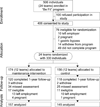Prevention of weight gain following a worksite nutrition and exercise program: a randomized controlled trial
- PMID: 22704742
- PMCID: PMC3377937
- DOI: 10.1016/j.amepre.2012.02.029
Prevention of weight gain following a worksite nutrition and exercise program: a randomized controlled trial
Abstract
Background: Many employers are now providing wellness programs to help employees make changes in diet and exercise behaviors. Improving health outcomes and reducing costs will depend on whether employees sustain lifestyle changes and maintain a healthy weight over time.
Purpose: To determine if a 9-month maintenance intervention immediately following a 10-week worksite exercise and nutrition program would prevent regain of the weight lost during the program.
Design: RCT.
Setting/participants: In 2008, a total of 330 employees from 24 teams completed a 10-week exercise and nutrition program at a large hospital worksite and were randomized by team to maintenance or control (usual care) for 9 months.
Intervention: Internet support with a website for goal-setting and self-monitoring of weight and exercise plus minimal personal support.
Main outcome measures: Weight loss, percentage weight loss, time spent in physical activity, and frequency of consumption of fruits/vegetables, fatty foods, and sugary foods at 1 year compared to baseline. One-year follow-up was completed in 2010, and data were analyzed in 2011.
Results: At 1 year, 238 subjects (72%) completed follow-up assessments. Mean baseline BMI was 27.6 and did not differ between intervention and control. Compared to baseline, both groups lost weight during the 10-week program and maintained 65% of weight loss at 1 year (p<0.001). There was no difference in weight loss between groups at the end of the 10-week program (4.8 lbs vs 4.3 lbs, p=0.53 for group X time interaction) or end of maintenance at 1 year (3.4 lbs vs 2.5 lbs, p=0.40 for group X time interaction). All subjects had improvements in physical activity and nutrition (increased fruits/vegetables and decreased fat and sugar intake) at 1 year but did not differ by group.
Conclusions: An intensive 10-week team-based worksite exercise and nutrition program resulted in moderate weight loss and improvements in diet and exercise behaviors at 1 year, but an Internet-based maintenance program immediately following the 10-week program did not improve these outcomes.
Trial registration: This study is registered at clinicaltrials.gov NCT00707577.
Copyright © 2012 American Journal of Preventive Medicine. Published by Elsevier Inc. All rights reserved.
Figures
References
-
- Kumanyika SK, Obarzanek E, Stettler N, et al. American Heart Association Council on Epidemiology and Prevention,Interdisciplinary Committee for Prevention. Population-based prevention of obesity: The need for comprehensive promotion of healthful eating, physical activity, and energy balance: A scientific statement from American Heart Association Council on Epidemiology and Prevention, Interdisciplinary Committee for Prevention. Circulation. 2008;118(4):428–464. - PubMed
-
- Wang YC, McPherson K, Marsh T, Gortmaker SL, Brown M. Health and economic burden of the projected obesity trends in the USA and the UK. Lancet. 2011;378(9793):815–825. - PubMed
-
- Finkelstein EA, Trogdon J, Cohen JW, Dietz W. Annual medical spending attributable to obesity: Payer- and service-specific estimates. Health Affairs. 2009;28:w822–w831. - PubMed
-
- Sturm R. The effects of obesity, smoking, and drinking on medical problems and costs. Health Aff (Millwood) 2002;21(2):245–253. - PubMed
-
- Thorpe KE, Florence CS, Howard DH, Joski P. The impact of obesity on rising medical spending. Health Aff (Millwood) 2004 Suppl Web Exclusives(Suppl Web Exclusives):W4-480-6. - PubMed
Publication types
MeSH terms
Associated data
Grants and funding
LinkOut - more resources
Full Text Sources
Other Literature Sources
Medical



